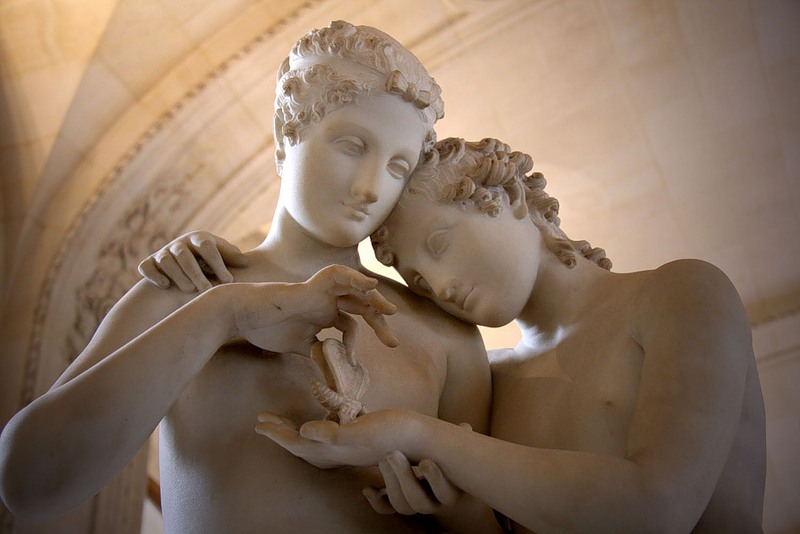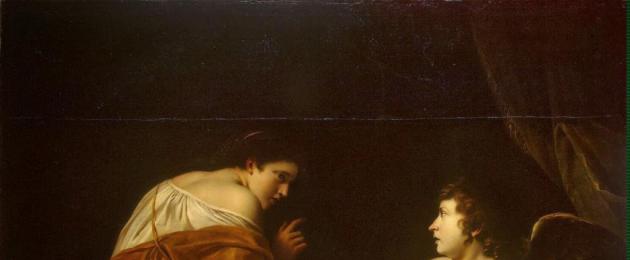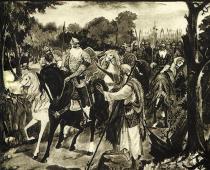Cupid (or Cupid) is the ancient Roman god of love, assistant and constant companion of his mother, Venus. He personifies the attraction and continuation of life on Earth and is represented as an angel with a bow and arrows.
Psyche is the ancient Greek goddess of the soul, the personification of breath. She is usually depicted as a girl with butterfly wings. An unusual love story has come down to us in the form of a short story in the novel "Metamorphoses" called "The Tale of Cupid and Psyche" by Apuleius, an ancient Roman writer and poet.
The king had three daughters, all of them were famous for their beauty, but more than others - the youngest named Psyche. The fame of her exceptional appearance spread to all corners of the world, and people came from everywhere just to admire her. It got to the point that Psyche was given completely divine honors, completely forgetting about Venus, the goddess of beauty.
As a result, Venus was offended and decided to eliminate her rival. Why did she call on the help of her son Cupid. She pointed out to him a beautiful rival and ordered him to make her fall in love with the most terrible, outcast and unattractive of people.
Psyche herself was not at all happy with her beauty. People admired her as a thing, and no one took her seriously and did not call her to marry.
Her grieving father asked the oracle for help. The answer was this: Psyche in burial clothes should go to the rock and marry a nightmarish monster. An even more unfortunate father took his daughter to the place where he left her alone. A sudden breath of wind took the girl to a wonderful castle, flooded with spirits, where she became the wife of a mysterious creature.
The happy life of Psyche was short: when the sisters found out about her, they were filled with envy and decided to destroy her life. They persuaded the girl to break her promise to her husband never to inquire about who he was. The sisters lied to her that he was actually a dragon that would eat her and her unborn child when she least expected.
As a result, they persuaded her to kill her husband at night. Taking a lamp, and armed with a sword, the naive Psyche did just that. She lit the lamp and went into the bedroom. In the light, she saw that her husband was the beautiful Cupid.

The girl was so amazed by the beauty of her husband that she admired and did not notice how a hot drop of oil fell from the lamp. She hit Cupid, and he woke up in pain. The husband was offended and annoyed by his wife's frivolity and distrust of him, and flew away from her at the same moment.
Deceived and abandoned, Psyche went to look for her betrothed. She wandered around the world for a long time until she was forced to bow to her rival - Venus. She was still looking for a chance to take revenge on the girl, for which she even sent Hermes after her. And the burnt Cupid, meanwhile, was being treated by her.
And so it happened: the spouses ended up under the same roof, and Psyche had to endure the persecution of the goddess of beauty, who wished her death, for which she came up with impossible tasks.
Trials of Psyche
Venus decided that she would let the lovers meet only if the girl completed four tasks. All these tasks were invented as impossible, but by some miracle every time Psyche managed to solve them.
In this sense, the psychological analysis of the myth of Cupid and Psyche is interesting. Each completed task made the girl stronger and developed her. She acquired the knowledge and skills that were necessary in order to become a Woman.
First
Venus brought Psyche to a room with a mountain of various seeds and gave the order to sort everything. According to psychologists, the symbolism of this task is as follows: before making a final decision, a woman must sort out her feelings. Sort and arrange everything on the shelves. She will have to put fears aside and separate the important from the unimportant.
Birds and insects helped Psyche complete the task. Upon its completion, Venus still did not want to let the girl go to her son and therefore came up with the next task.

Second
Psyche had to get the golden fleece from the rams of the sun - large evil monsters that could easily trample her. On the way to the task, the girl met a reed who advised her to wait for the night when the animals left the field.
In terms of psychological analysis, this is a metaphor for the empowerment of a woman. She must be able to find her strength without sacrificing either her personality or her capacity for empathy.
Third
The girl was supposed to get water from a forbidden spring on the highest rock. Psyche would have been crushed to death if the eagle had not come to her aid. Here psychologists read the ability to see the full picture of what is happening, without which big tasks cannot be solved.
Fourth
The last test was to get a box of ointments for healing from the underworld. Going down to the underworld is tantamount to death itself. And here the reading is this: focus on the goal and be able to refuse people when necessary.
On the way back, Psyche came across many infirm people, praying for medicines in her hands. But she had to complete the task and not allow herself to be distracted, despite her sympathy for the suffering.
Psyche wasn't sure she could handle it. This time, stones helped her, letting her through to the place where the casket was stored. Rock stones are a very important symbol. Psyche's only man-made assistant in all of history is like the memory and experience of all the women who went through trials before her. They were with her in the most difficult test and instructed the girl: she must finally overcome what they were unable to do.
The goddess Persephone gave the girl a box and ordered not to open it. And here it again became difficult for Psyche to cope with her nature: on the way back, she nevertheless opened the casket to take some of the divine beauty. And in the bank there was not beauty, but an underground deadly dream that immediately seized her. But the story of Cupid and Psyche does not end there.
For a long time the girl lay somewhere between the world of the living and the dead. Meanwhile, Cupid recovered from burns, seized the moment when Venus could not see him, and went in search of his betrothed. He removed the dream from the girl, put it back in the box, and with a light prick of his arrow awakened Psyche. He ordered his awakened wife to take the box to his mother and promised to take all the rest of the trouble on himself.

When the task was completed, Cupid took his betrothed to Olympus, where he received Zeus's permission to marry Psyche. In order to marry a couple according to all divine laws, he gave the girl immortality and ranked her among the host of gods. A magnificent wedding took place, at which everyone was present, and even Venus occupied a place of honor and rejoiced for her betrothed. The couple had a daughter, Volupia, the goddess of pleasure.
The legend about Cupid and Psyche comes down to one simple statement: only the union of love and soul gives rise to true pleasure and happiness.
Image of Psyche

deadly marriage
An analysis of "Cupid and Psyche" gives an understanding of the motif dedicated to the death of the bride. In many fairy tales, it will be repeated: it is always a stepmother or mother-in-law, envious of her daughter-in-law and sending her to death. From the point of view of the mysteries, every marriage is such a lonely expectation of the bridegroom on the mountain, a foretaste of death, fear that he is a monster. In addition, she was given to him against his will and against his will.
That is, we are talking about femininity, tender and blooming, subordinate masculinity. For a woman, marriage and deprivation of innocence is a mystery and a moment of transition, as well as a symbolic death necessary for rebirth and acquiring a new role - a wife. And for a man, this is conquest and abduction.

Psychologists say that the sisters in the myth reflect the shadow side of the heroine herself. This is her protest against imprisonment, life in captivity: she does not see and does not know her husband, who kidnapped her and took possession of her. Psyche considers him a monster to whom she was bequeathed. And although he is gentle and kind to her at night, she cannot obey until she makes an independent choice.
It is also interesting that in myth, unlike fairy tales (for example, "The Scarlet Flower" and "Alyonushka"), Psyche makes an independent choice. Fairy-tale heroines are deceived and framed by their sisters: they are 100% victims of circumstances and higher powers and cannot influence anything. Maybe that's why fairy tales end so quickly - their heroines are passive. That is, as a result, there is no rebirth. Whereas Psyche, after all the adventures, turns from a man into a goddess.
First contact
Psyche succumbs to the exhortation of her sisters (her shadow) and decides to kill her husband and free herself from captivity. The myth is also interesting because the girl really loves a good husband in him, but hates the monster that she thinks is sitting in him. She makes a difficult choice.
With an oil lamp in her hand, Psyche approaches her sleeping husband. According to one version, she herself is wounded by his arrow and finally falls in love with Cupid. Psychologists consider this moment a turning point in the history of femininity, since before that the idea of the relationship between men and women was reduced to the divine power of the former and the subordinate, passive acceptance and following of the latter.

In the work of Apuleius, Psyche herself performs actions, as a result of which she meets a man in the flesh (whom she had not even had the right to see before). That is, she ceases to be a woman - a victim of circumstances. This is equal to the exit from the darkness, from the area of the unconscious. In the light, she discovers that there is no difference between a husband and a monster. It ceases to be passive and becomes loving and self-giving consciously.
And at the same time, she does not give up her feminine essence, but, on the contrary, awakens and strengthens it to the level of the Amazon.
Inner Cupid
When Psyche sees her betrothed and falls in love with him, an image of her Cupid is created inside her. This is the image of her love, the highest expression of the being that is now in front of her in physical form. According to one version, Cupid flies away because he is unable to compete with the new image in Psyche's head.
The myth of the love of Cupid and Psyche is filled with adventure and romance. He talks about the wanderings of the soul, longing to merge with love.
- In contact with 0
- Google+ 0
- OK 0
- Facebook 0








